Teacher's Day! Especially if you teach IT
Do you remember your first computer science teacher at school? What did he give you? Was he the person who inspired you to connect your life with IT? Alas, for most of us things were different - the algorithms, screen savers on Basic and infinite control with the transfer of numbers from one number system to another inspired only absenteeism. And someone did not have computer science at all. Our best teachers in IT appeared later - our leaders, tutors, tutors, university teachers and employees of a corporate university.
On the eve of Teacher’s Day, we talked with four teachers from our training center. All of them devoted themselves to one of the most difficult areas of training - information technology. Yes, they learn IT. Teach IT to adults. Adults to adult technology. Here the pointer does not help, here the approach is needed, the nerves-ropes and the ability to prove that you are standing in front of cool specialists and really can teach them.
We hope that this material will inspire those who would like to study, but did not dare to do this for various reasons. In addition, right now there is a chance to win certificates for free training at MS Office distance user courses, for example, for your company secretary or accountant. The best gift to those who in the most active way addresses you with requests “# tyzhprogramist”. At the end of the text there are 10 facts from the life of our training center, two of which are fiction. Among those who correctly indicate them, we will play 10 certificates. Replies can be posted in the comments below this post. Break a leg! Please colleagues.

A source
Everyone comes to the profession of a teacher of information technology disciplines in different ways. For some, this occupation becomes a vocation for life, for some it is just a stage on the path to becoming an IT specialist or a pleasant combination of work and teaching. We asked the teachers of the LANIT training center how they ended up in this profession and why they remained in it. We present you their stories.
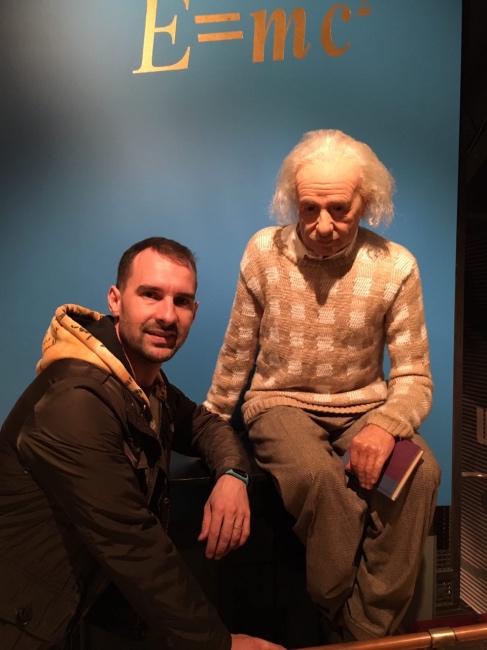
(No, Dmitry on the left)
As a child, did you dream of becoming a teacher?
At that time, I had a high degree of uncertainty: I wanted to become a cook, and for a very long time - a lawyer. But, by and large, my choice was determined by the courses at the training and production plant at our school. There we could choose a profession. I chose the specialty "Computer Operator". This connected me with computer technology, and I realized that I did not want to be a lawyer. True, it cannot be said that I immediately decided to become a teacher. I was helped by my school teachers, who advised me to try, if there is a desire. I decided to try, entered and graduated from the pedagogical university of Nizhny Novgorod. (By the way, I did not regret a single day about my choice.) After that I taught mathematics and computer science to children. In 2011, I was invited to one of the private schools in Moscow.
Several times I was offered to be the principal of the school, but this did not appeal to me. After thinking, I went to work as a teacher in projects - we trained users of the Unified Medical Information and Analytical System of the city of Moscow (EMIAS). So I stayed to work at the LANIT training center.
During the teaching of adult students, did you feel that there was still a little ceiling?
We work with different courses. Each teacher has the opportunity to fully realize themselves in related fields: to learn new things by creating training materials for customers from the banking sector, legal sphere, medicine, etc. There is no stagnation. In terms of capabilities, there is no ceiling either. Another thing is that a person can get fed up with work, get tired of it. I think that then you don’t have to torture yourself or others. A teacher who is not inspired by himself cannot inspire students.
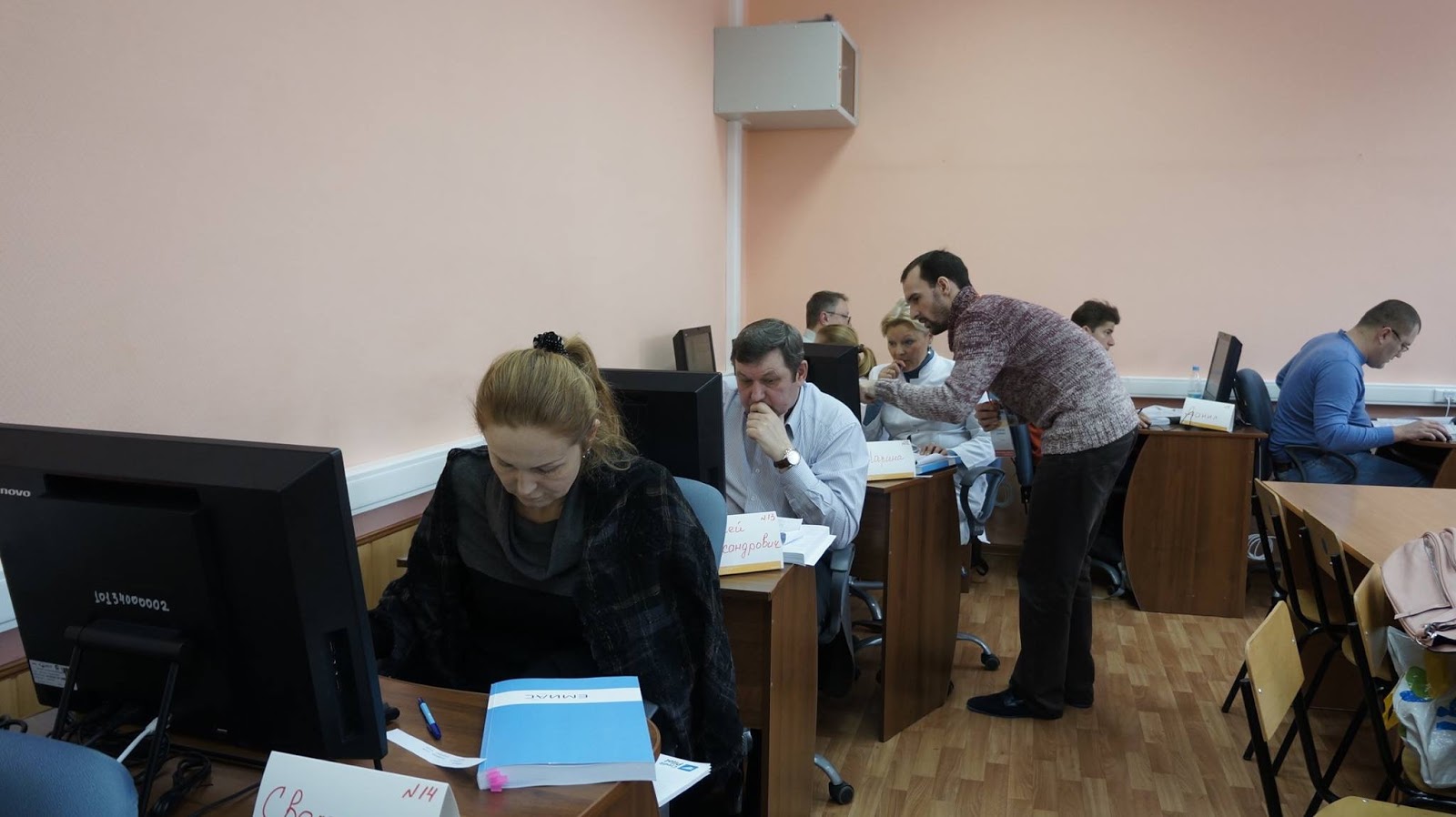
Training for medical college teachers at EMIAS
Is there a career ladder for teachers?
You can become a team leader who coordinates the work of colleagues. In our team, we try to change roles, so that everyone tries himself in the role of performer, implementer and coordinator. Therefore, we strive to select people who are able to quickly switch. The educational and methodological activity is closer to me: from the development of materials to their broadcast to the audience.
Is it easy to train IT professionals?
In adult learning, the field is not plowed. You can find a lot for yourself. Specialists come to courses with a certain body of knowledge. The main task of a teacher is not only to teach, but not to destroy a person. If you plant your point of view, there is a risk of depriving the student of creativity in learning. Therefore, the process of forming a teacher is long. In addition to knowledge of the structure of classes, which consists of a motivational and substantive component, a reflective-evaluative stage, it is important for him to maintain the desire to learn new things, including techniques for working with the audience. Especially, it concerns motivation.
We often train people whom companies send without fail. It is good if for such students the purpose of training coincides with their internal motives. Ideal - if they themselves choose a training program, but often this does not happen. Therefore, the task of the teacher is to make the training of each person personally significant. Most are included in the process when the course solves their problem. In order to be able to pay attention to everyone, the optimal number of students in the group is 8-12 people.
 Source
Source
How often do you study? Are there any favorite topics that you study not for work, but for pleasure? Maybe apply something in practice?
I like to find something interesting in site building, but I do all the projects only for myself. I have favorite blogs that I regularly review. If I want to learn something ( from the link - the section "How to Learn and not to Forget - Struggle with Human Nature" ), then after the lesson I try to look through the notes and complete the tasks, find a new task that can be solved using new material. A man remembers only what his hands do.
Do you test new techniques before using them in the audience?
In our department there are methodical days that we spend regularly. My colleagues and I share our best practices. This is our test group. When I am preparing for the course, I say everything: I decide, I think about what it will be possible to give additionally, if suddenly the group comes across a strong one. As a teacher, I must be prepared for any turn of events.
The unexpected usually happens when you read the course for the first time and still do not know how it will go. Only after the first lesson, even if the teacher rehearsed everything in advance, the emphasis will be re-arranged. Because any rehearsal is an equalization to an ideal situation, when listeners will answer the first time and correctly.
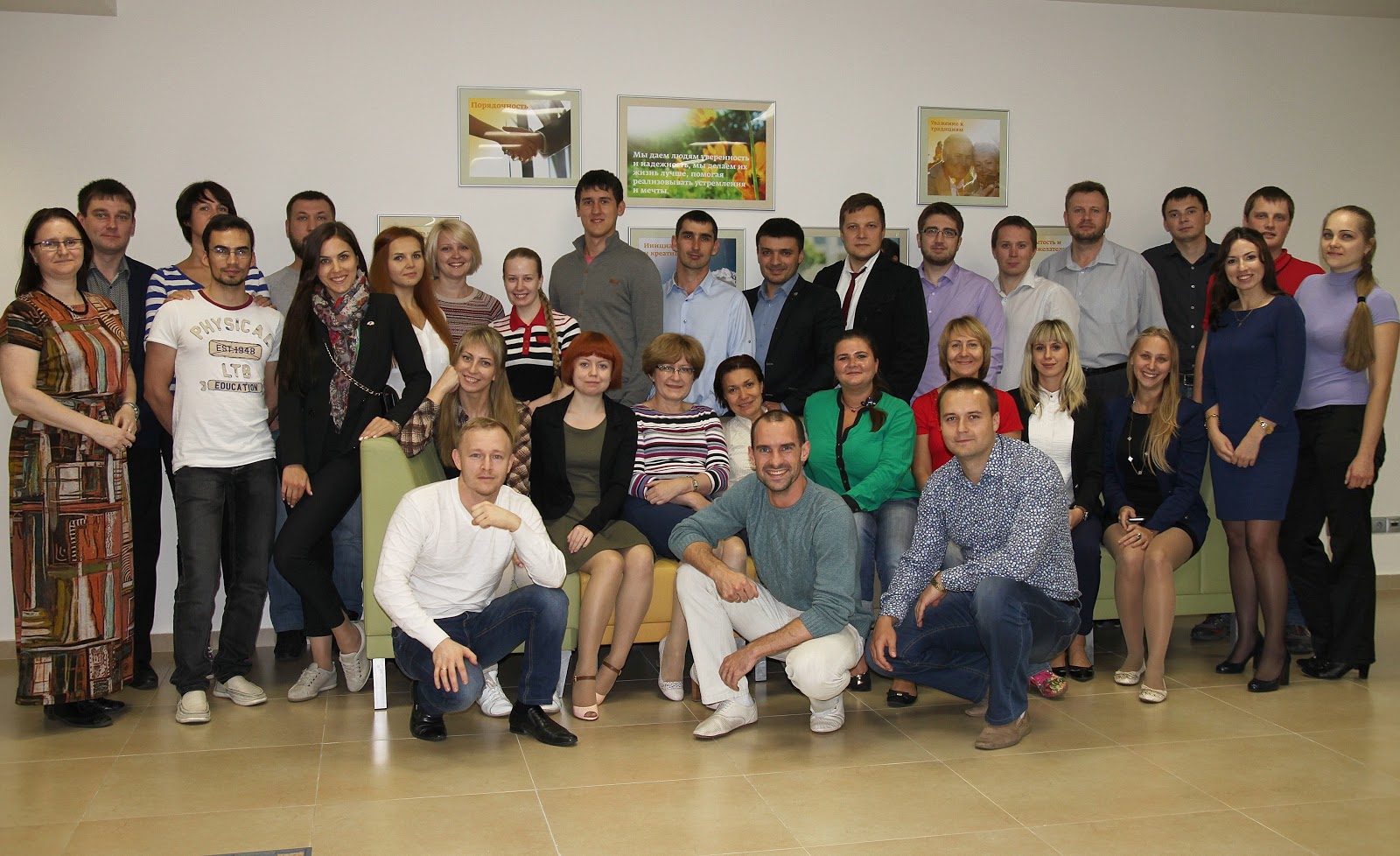
The group that Dmitry taught with Alena Nadezhdina.
Do you have any courses that you like best?
We, like DJs on the radio, can listen to your favorite music at home (laughs). Of course, each of us has courses that, due to our interests, are closer and dearer, but this does not prevent us from broadcasting any other content. With us, when someone finds some kind of new chip, they must share it. And the peculiarity of the courses that our team develops is that other teachers can teach them. We can even teach teachers.

(Yes, our teachers prefer outdoor activities)
When did you want to become a teacher?
When I was finishing school, I realized that I wanted to teach others. But after talking with my mother, I chose a university without being tied to teaching. My mother is from the first issue of programmers. Since childhood, I remember how I came to the machine room, and there was Ural 3 - one of the first computers delivered at the university. In a word, from childhood he was immersed in computer technology.
For almost 20 years I was engaged in science (physics), but part-time worked at the university. At first, at the Polytechnic Institute he taught computer science to silicates. By the way, these were the most difficult students in terms of level of training - hellish patience was required with them.
Then, at his native university, he taught a special course on the numerical modeling of physical processes. In science, he did a lot of computing on computers. Later, already working at the University’s Information and Computing Center, I had the opportunity to implement the Sun Microsystems UNIX cluster of computers and participate in the organization of the inter-university network. This was also useful in the work of our scientific group, for which the prompt exchange of information was important. I myself am from Yekaterinburg, and part of our group was in Moscow.
After being taught computer science of future silikatits, how much easier is it to work with IT specialists who have strong training and experience behind them?
The training of IT professionals from the training of students differs primarily in manner. Students are like a blank sheet, they are devoid of stereotypes. But students with experience come to courses at the Network Academy. If the authority of the teacher is sufficient for students, then credibility does not count for our students. But, in principle, there are difficulties with both university students and adult students of courses in training centers .Especially if a person has not done this before: for example, he was an English teacher, and then decided to become an IT specialist. In the dashing 90s there were many. In the crisis year of 1998, many went abroad, and their specialties abroad were not in demand, so people made such a sharp transition. Of course, it was hard for them, mainly because of a lack of basic knowledge. But humanities in the IT sector have a chance of success. They even have some advantages, for example, when creating translators, languages, search engines. Linguistics is needed here, and people can find their niche.
 Source
Source
The task of the teacher is to inspire and ensure complete immersion in the topic.
Inspiring others to learn, do you consider yourself a motivated person?
I must keep pace with the development of technology. The profession of a teacher differs from other professions in that he must be able to process large amounts of information in a short time and extract knowledge from what he has read. It comes with experience. In my estimation, even a very good university student, who learns quickly and can do a lot, becomes a teacher who can safely release one to an audience of any complexity, after no less than three years of practice, or even after five.
Sometimes IT professionals want to become teachers. Once with such a very intelligent professional, we did a debriefing of “flights” after a test lecture. He was very surprised when we explained to him what he had to do, except for the actual presentation of the material. In the end, he admitted that he did not understand how difficult the work of the teacher.
But, of course, if a person really wants to become a teacher, then he will almost certainly be able to. You only need to very, very much want. Somehow at the audition was my former student, with whom we later engaged in scientific work. I invited him to become a teacher at our training center, and he agreed. After the trial lecture, all our teachers said that he was not suitable because of his too quiet voice. I still offered to give him a chance. A year later, in class, he spoke so that he could be heard throughout the training center, then he became one of our leading teachers. By the way, he still successfully teaches.
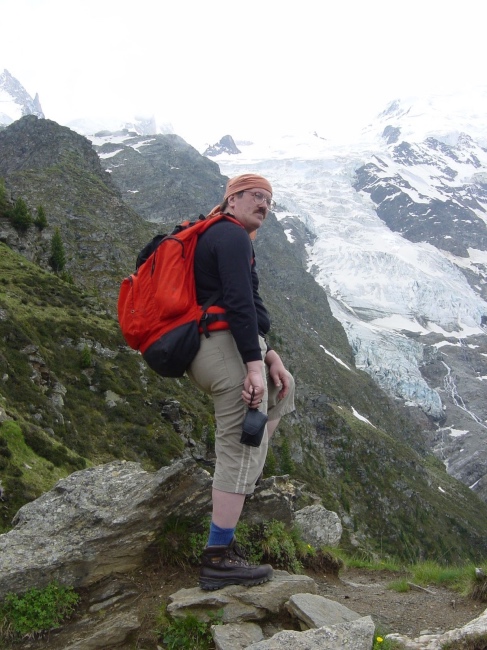 Hike to the Polar Urals - the northernmost part of the Ural Mountains.
Hike to the Polar Urals - the northernmost part of the Ural Mountains.
How are training courses designed?
Our training center has its own development methodology, which has evolved over the years. But with the advent of new formats (for example, video, e-books), the methodology is changing. Modern cloud information technology also has a strong impact on the methodology for preparing training materials. For example, they previously installed Microsoft Office and have been living with it for 10 years. Once I learned and work. Now the situation has changed radically: there is Microsoft Office 365, which is installed from the cloud and in which changes can occur almost every day. Time for training is more and more pressed every year. Today, vendors and training centers are at a crossroads, since it is not entirely clear how to organize the process of continuous learning in practice. One day of training is a minimum of 40 pages of material. The teacher can prepare eight pages a day. It turns out that a person spends a week to spend one day of training. If the course is designed for five days, it will take five weeks. Plus control and laboratory - this is another two weeks. Total - seven weeks. The course is ready, but the vendor has updated everything during this time.
And what to do?
Search for options. Authorized training demonstrates stagnation; the initial “hunger” for IT knowledge has passed. It used to be, when personal computers began to appear in large numbers in homes and companies, there was a shortage of specialists to service them. Therefore, it was necessary to quickly and accurately prepare personnel. Vendors coped with this task and managed to do new training courses in accordance with the development of their products. Teachers received courses even before the product entered the market. Over time, when the mass grew, and staff shortage was satisfied, the need for mass authorized training began to decline. This is the trend of the last five years. Vendors and training centers are being rebuilt: they are switching to electronic textbooks, laboratory work is being transferred to the cloud - to the data centers of training vendors. We are also changing the approach to the work of teachers.Applying video technologies and our know-how in the field of knowledge control ( more details can be found on the link in the section “A large selection of interactive educational materials is great. Or not?” ), can conduct several courses in one class. Learning is becoming more dynamic, and you can not stagnate while enjoying your success. It is necessary to research and think, think and realize.

How did you decide to become a teacher in one of the most dynamic fields?
I had wonderful teachers of mathematics, physics and chemistry, looking at whom I wanted to work in this area. I entered the Ural State University in Yekaterinburg for a mother-in-law, but there was a lot of theory and very little practice. This did not suit me. In parallel, I worked at the Department of Informatics at the Russian State Vocational Pedagogical University, where this practice was many times more. So I decided to transfer to where they taught to teach technicians. After graduation, she stayed there.
How are techies different from any other student groups?
Technicians immediately want to touch everything. In addition, they need maximum algorithmization and visualization.
While studying, I worked as an assistant in the department, then in a commercial training center, and later moved to the Network Academy. My students were first students, and only then adults. I had to combine the knowledge that they had with that which they received during training on the course. Often, when they come to work after high school, students hear a common phrase: "Forget everything that you were taught at the institute." I am not a supporter of this approach. My approach is the task, try to apply everything that you know and know how to, well, learn new things.
 Ice skating is one of the best ways to relax
Ice skating is one of the best ways to relax
. What would you like to warn beginner IT teachers about?
Do not try to show that you are smarter than listeners - this is obviously the wrong way. We must try to give as much as possible the knowledge that you have, and get feedback from the audience. This is still happening here: for many years we have been teaching Excel, but sometimes in the classroom there is someone who says that he knows another way to solve the problem. This is a great option for mutual enrichment: you have learned new things, and the listener is pleased that the teacher accepts the idea, shares it with the audience.
Is there a difference in teaching one person and assembling a stadium?
When you learn one thing - this is an individual approach in which you can clearly and accurately work out everything, repeat as much as a specific person needs. At the same time, there is a risk of moving away from the general topic of the course and focusing exclusively on the answers to questions. When you start teaching, it's hard to control it. Now I have experience to “keep” the course: to keep the attention of the audience and to lead, to pass the material without falling in particular, etc.
There are difficulties in a large group - you do not have time to “run” to everyone: while you reach the last, the first ones are already bored. Therefore, in large audiences this is more of a show than a full-fledged training.
What devices / equipment help you conduct your classes?
In our training center, a complete set of materials necessary for conducting classes has long been established. But now they have begun to use more often videos, screencasts and simulators that help automatically test practical skills.
 Source
Source
Does your profession allow you to prove yourself, to reveal your abilities ?
Yes. Despite the fact that now I conduct classes very little and miss it, I am implemented in the work of the head of the department for the development of educational materials.
My task is to plan, issue, monitor and accept the work on the development of teaching materials necessary for conducting courses. I myself am also in the role of performer. I do not give a descent.
It seems to me that ambitious people have not worked in our profession for a long time. Everything here is different, you can not measure either the status or the number of subordinates. Although each has its own implementation criteria. I belong to those people who do not choose idols, but with great respect for professionals. I am a fan of Anton Makarenko. Among modern specialists who are published on the Internet, I look at the blog of Nikolai Pavlov , the author of a huge number of books on Excel.

How do you see your profession in the future?
Most have basic knowledge, but they are not structured. Therefore, often people try not to get new knowledge, but to sort through the available knowledge. For such students, tests have been developed, the results of which show that it is necessary to "patch". Thought out andthe sequence of training (under the link section "How to learn and not to forget - we fight with human nature") . The task of the teacher is not to give knowledge, but to teach them how to get it.
Do you feel that the student has a “crisis of the genre”? What are you doing in this case? What motivation really works?
If the teacher hears phrases such as “I'm tired,” “ceased to understand,” “let's go back a little,” it is immediately clear that the student needs help. It is necessary to pause or repeat what is not clear. But there is a situation when a person for some reason does not want to admit. Then you need to find an individual approach to it, clarify whether everything is clear with what to help, and provoke the listener to action. Sometimes an ordinary joke is enough, but in order not to focus on someone specific, it should be understood not only by one person, but by the whole group. That kind of motivation works great. Of course, there are cases that this does not save, a person simply does not have the vitality to do something. It’s rare in my practice, but it happened that people just asked for time from classes.

What is it like to teach adults? Did you have to teach someone before?
I used to work at the institute with ordinary students. With adults, it’s more interesting to me because you don’t have time to get used to the group, more unexpected situations happen, a lot of variety.
Students have a habit of learning, i.e. a kind of stereotype of learning. Adults, on the other hand, are all different, each with their own charter: someone was forced to go to work to study, someone consciously took the course, someone is interested, someone just has not studied for a long time and is interested in the process itself. Of course, when a person came for specific knowledge, he is motivated. It’s easy to work with such people.
What helps you conduct classes?
Now we are developing simulators. Interactive training allows you to consolidate skills and test knowledge. The direction of gamification is gaining popularity - we are following this, but we are not yet applying it in our training programs. Now we are working on the creation of an interactive component in distance learning. It is important that the listener answers questions, does exercises and additional tasks, and does not just watch the video.
How did you start teaching information technology? How many years have you been doing this?
By my first education I am an engineer, worked at a research institute. When my daughter went to first grade, and the question arose of what to do in order to keep up with everything, I got a job at the Institute at the Department of Information Technology. I worked there for about six years, after which I began to think about pedagogy. I once had a desire for this, but I did not dare. As a result, it turned out that I still came to this.
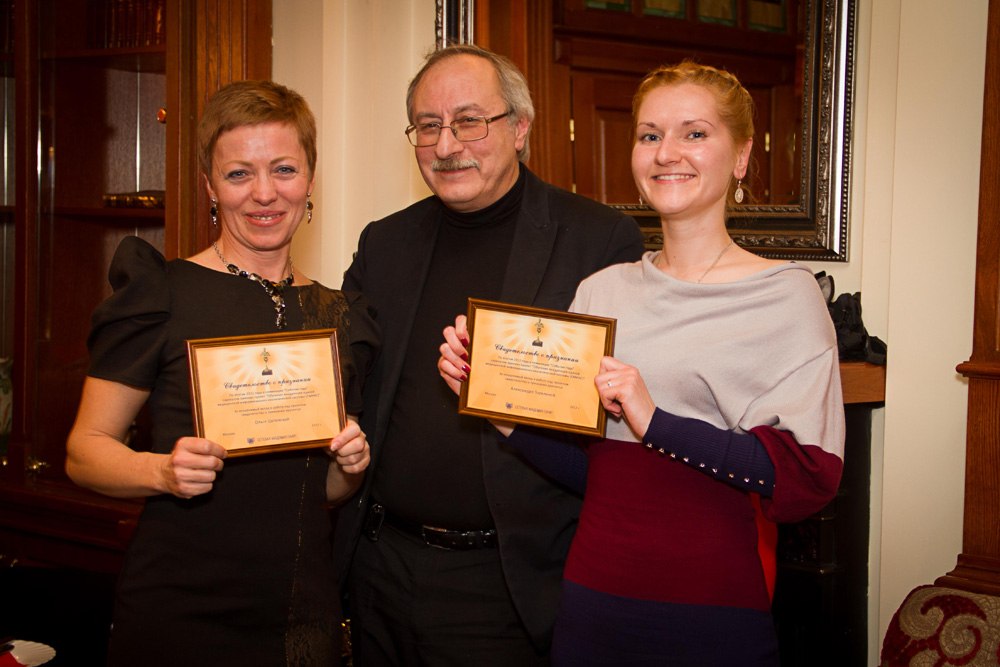
Olga (left) with colleagues during the ceremony of presenting certificates of the training center to the best in the profession for the year.
At a certain professional stage, many people think about the possibility of leaving for teachers. Do you think this is worth doing or not?
I advise you to try. For example, I know people who left school. Why not do it the other way around. The inner mood is important here.
We have a handbook for teachers. In fact, this is a textbook that outlines the main differences in the process of adult learning. For example, it says that you must respect the professional experience of the audience. If a person is studying, this does not mean that he is not competent. Some, for example, are generally afraid to learn, because the last time they did it a long time ago. The task of the teacher is to provide a comfortable environment. It is important to understand how a person feels among colleagues. Often, adults are afraid to show that they don’t know something, do not know how to do it, or think slowly. It is necessary to see such uncertain and support, so as not to be shy to ask questions.
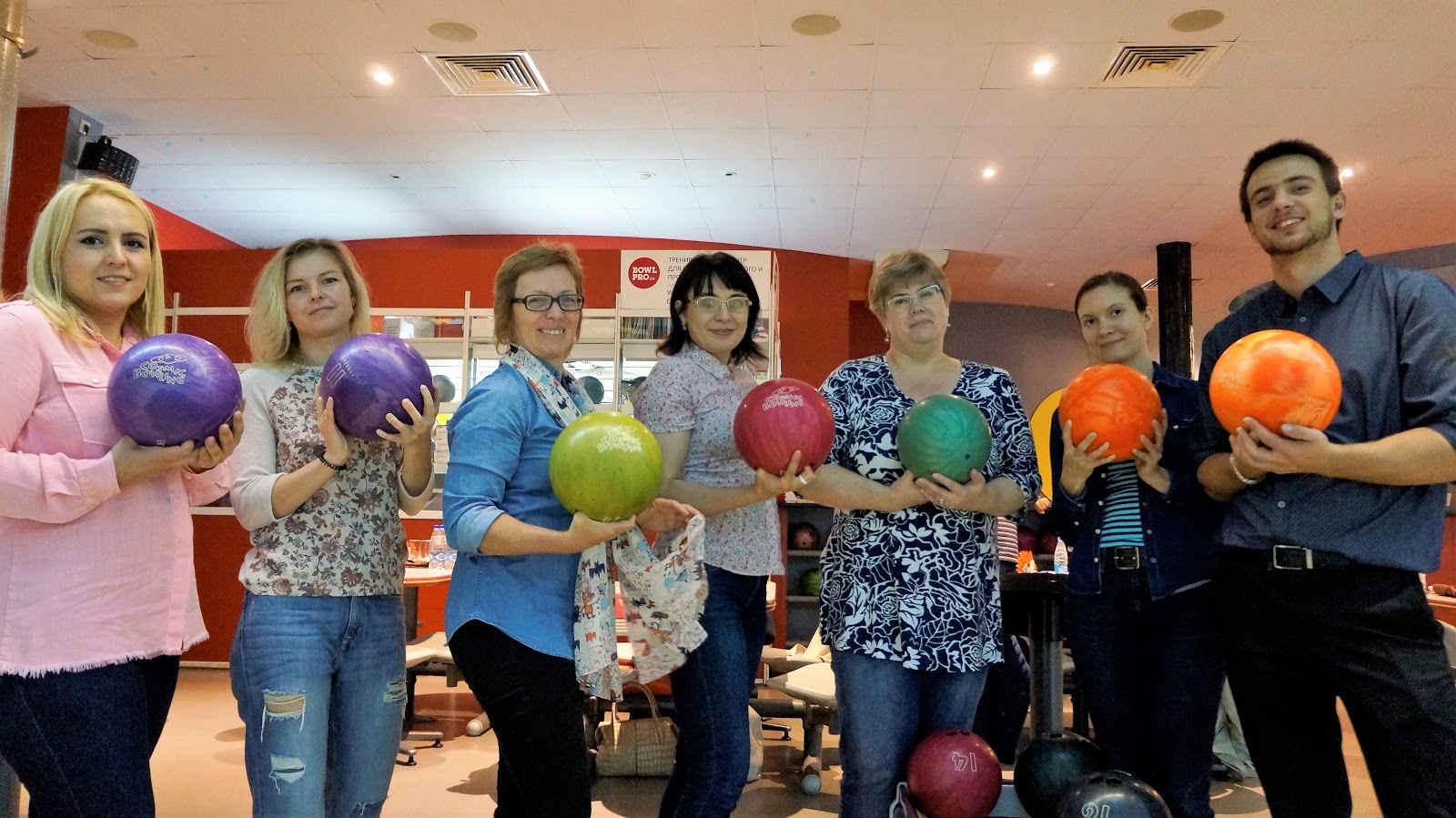
Teachers can teach not only in IT
. What question do you most often have to answer to students?
At the end of training, they are usually interested in how to get even more knowledge, what courses we still have. People try to find useful for themselves, some then continue to learn.

Source
Congratulations to all teachers on Teacher's Day, and we invite readers to participate in a flash mob with us.
Right from these lines one can prepare to choose two out of ten facts about the LANIT Networking Academy , which are fiction. The first ten participants who answered correctly, on October 5, Thursday, we will give certificates for free training at one of the distance user courses MS Office. We are sure that the gift will be useful to your colleagues, who probably often turn to you with requests in the spirit of “# tyzhprogramist”. Answers can be posted under this post.
10 facts about the LANIT Network Academy. Which two of them are untrue?
On the eve of Teacher’s Day, we talked with four teachers from our training center. All of them devoted themselves to one of the most difficult areas of training - information technology. Yes, they learn IT. Teach IT to adults. Adults to adult technology. Here the pointer does not help, here the approach is needed, the nerves-ropes and the ability to prove that you are standing in front of cool specialists and really can teach them.
We hope that this material will inspire those who would like to study, but did not dare to do this for various reasons. In addition, right now there is a chance to win certificates for free training at MS Office distance user courses, for example, for your company secretary or accountant. The best gift to those who in the most active way addresses you with requests “# tyzhprogramist”. At the end of the text there are 10 facts from the life of our training center, two of which are fiction. Among those who correctly indicate them, we will play 10 certificates. Replies can be posted in the comments below this post. Break a leg! Please colleagues.

A source
Everyone comes to the profession of a teacher of information technology disciplines in different ways. For some, this occupation becomes a vocation for life, for some it is just a stage on the path to becoming an IT specialist or a pleasant combination of work and teaching. We asked the teachers of the LANIT training center how they ended up in this profession and why they remained in it. We present you their stories.
By the way, about this training center
LANIT Networking Academy opened its doors in 1995. This year she turned 22 years old. During this time, we trained more than 350 thousand people - and not only the Lanitovites.
Historically, IT specialists undergo training and professional development. But for many years now we are also engaged in corporate educational projects. Among them are such large-scale ones as the training of users of the GIS housing and communal services and the Unified medical information and analytical system of Moscow , the training of public observers for the exam procedure .
The training center also develops training materials and tests, shoots video courses, implements a system for assessing staff knowledge and skills, creates multimedia electronic publications based on its own cross-platform solution “LANIT Electronic Books”.
Historically, IT specialists undergo training and professional development. But for many years now we are also engaged in corporate educational projects. Among them are such large-scale ones as the training of users of the GIS housing and communal services and the Unified medical information and analytical system of Moscow , the training of public observers for the exam procedure .
The training center also develops training materials and tests, shoots video courses, implements a system for assessing staff knowledge and skills, creates multimedia electronic publications based on its own cross-platform solution “LANIT Electronic Books”.

Dmitry Sharabin, head of the training department
(No, Dmitry on the left)
As a child, did you dream of becoming a teacher?
At that time, I had a high degree of uncertainty: I wanted to become a cook, and for a very long time - a lawyer. But, by and large, my choice was determined by the courses at the training and production plant at our school. There we could choose a profession. I chose the specialty "Computer Operator". This connected me with computer technology, and I realized that I did not want to be a lawyer. True, it cannot be said that I immediately decided to become a teacher. I was helped by my school teachers, who advised me to try, if there is a desire. I decided to try, entered and graduated from the pedagogical university of Nizhny Novgorod. (By the way, I did not regret a single day about my choice.) After that I taught mathematics and computer science to children. In 2011, I was invited to one of the private schools in Moscow.
Several times I was offered to be the principal of the school, but this did not appeal to me. After thinking, I went to work as a teacher in projects - we trained users of the Unified Medical Information and Analytical System of the city of Moscow (EMIAS). So I stayed to work at the LANIT training center.
During the teaching of adult students, did you feel that there was still a little ceiling?
We work with different courses. Each teacher has the opportunity to fully realize themselves in related fields: to learn new things by creating training materials for customers from the banking sector, legal sphere, medicine, etc. There is no stagnation. In terms of capabilities, there is no ceiling either. Another thing is that a person can get fed up with work, get tired of it. I think that then you don’t have to torture yourself or others. A teacher who is not inspired by himself cannot inspire students.

Training for medical college teachers at EMIAS
Is there a career ladder for teachers?
You can become a team leader who coordinates the work of colleagues. In our team, we try to change roles, so that everyone tries himself in the role of performer, implementer and coordinator. Therefore, we strive to select people who are able to quickly switch. The educational and methodological activity is closer to me: from the development of materials to their broadcast to the audience.
Is it easy to train IT professionals?
In adult learning, the field is not plowed. You can find a lot for yourself. Specialists come to courses with a certain body of knowledge. The main task of a teacher is not only to teach, but not to destroy a person. If you plant your point of view, there is a risk of depriving the student of creativity in learning. Therefore, the process of forming a teacher is long. In addition to knowledge of the structure of classes, which consists of a motivational and substantive component, a reflective-evaluative stage, it is important for him to maintain the desire to learn new things, including techniques for working with the audience. Especially, it concerns motivation.
We often train people whom companies send without fail. It is good if for such students the purpose of training coincides with their internal motives. Ideal - if they themselves choose a training program, but often this does not happen. Therefore, the task of the teacher is to make the training of each person personally significant. Most are included in the process when the course solves their problem. In order to be able to pay attention to everyone, the optimal number of students in the group is 8-12 people.

How often do you study? Are there any favorite topics that you study not for work, but for pleasure? Maybe apply something in practice?
I like to find something interesting in site building, but I do all the projects only for myself. I have favorite blogs that I regularly review. If I want to learn something ( from the link - the section "How to Learn and not to Forget - Struggle with Human Nature" ), then after the lesson I try to look through the notes and complete the tasks, find a new task that can be solved using new material. A man remembers only what his hands do.
Do you test new techniques before using them in the audience?
In our department there are methodical days that we spend regularly. My colleagues and I share our best practices. This is our test group. When I am preparing for the course, I say everything: I decide, I think about what it will be possible to give additionally, if suddenly the group comes across a strong one. As a teacher, I must be prepared for any turn of events.
The unexpected usually happens when you read the course for the first time and still do not know how it will go. Only after the first lesson, even if the teacher rehearsed everything in advance, the emphasis will be re-arranged. Because any rehearsal is an equalization to an ideal situation, when listeners will answer the first time and correctly.

The group that Dmitry taught with Alena Nadezhdina.
Do you have any courses that you like best?
We, like DJs on the radio, can listen to your favorite music at home (laughs). Of course, each of us has courses that, due to our interests, are closer and dearer, but this does not prevent us from broadcasting any other content. With us, when someone finds some kind of new chip, they must share it. And the peculiarity of the courses that our team develops is that other teachers can teach them. We can even teach teachers.
Case from the practice of teachers at a training center.
It was on New Year's Eve. A student from somewhere from Stavropol studied with us. I studied for a long time. A month, or even more. And somehow a colleague came up to me and said, they say, a valuable client, he finished his studies, he had accumulated textbooks, I need help - a couple of boxes of books in a car should be loaded. Okay, I’ll say, I’ll help, of course. Moreover, they promised an assistant. I think for two it will be better what to carry there. I go to the classroom ... and there are a dozen and a half boxes! Previously, such textbooks were sent from Germany, and each 10-15 kg weighed (with textbooks, of course). This mountain lies on the floor, packed to the limit and lovingly pasted with scotch tape, but I don’t even have a cart to load it all.
The listener, probably, collected the textbooks of all his colleagues who were studying at the same time. Maybe I also bought something as a gift to my colleagues, I don’t know. In general, I decided to move a little to the exit with these boxes, and there the assistant will do.
How could he stole everything. I'm waiting. Sweat pours out with me. The promised "assistant" comes up.
“Yeah,” I say. - Here are your boxes, take it!
“No,” he answers. - I can’t, my back hurts.
So I had to drag it all out to the car, and in the yard frost, wind, snow - beauties.
I still remember this listener on the eve of the New Year holidays.

Sergey Tretyakov, Head of Department
(Yes, our teachers prefer outdoor activities)
When did you want to become a teacher?
When I was finishing school, I realized that I wanted to teach others. But after talking with my mother, I chose a university without being tied to teaching. My mother is from the first issue of programmers. Since childhood, I remember how I came to the machine room, and there was Ural 3 - one of the first computers delivered at the university. In a word, from childhood he was immersed in computer technology.
For almost 20 years I was engaged in science (physics), but part-time worked at the university. At first, at the Polytechnic Institute he taught computer science to silicates. By the way, these were the most difficult students in terms of level of training - hellish patience was required with them.
Then, at his native university, he taught a special course on the numerical modeling of physical processes. In science, he did a lot of computing on computers. Later, already working at the University’s Information and Computing Center, I had the opportunity to implement the Sun Microsystems UNIX cluster of computers and participate in the organization of the inter-university network. This was also useful in the work of our scientific group, for which the prompt exchange of information was important. I myself am from Yekaterinburg, and part of our group was in Moscow.
After being taught computer science of future silikatits, how much easier is it to work with IT specialists who have strong training and experience behind them?
The training of IT professionals from the training of students differs primarily in manner. Students are like a blank sheet, they are devoid of stereotypes. But students with experience come to courses at the Network Academy. If the authority of the teacher is sufficient for students, then credibility does not count for our students. But, in principle, there are difficulties with both university students and adult students of courses in training centers .Especially if a person has not done this before: for example, he was an English teacher, and then decided to become an IT specialist. In the dashing 90s there were many. In the crisis year of 1998, many went abroad, and their specialties abroad were not in demand, so people made such a sharp transition. Of course, it was hard for them, mainly because of a lack of basic knowledge. But humanities in the IT sector have a chance of success. They even have some advantages, for example, when creating translators, languages, search engines. Linguistics is needed here, and people can find their niche.

The task of the teacher is to inspire and ensure complete immersion in the topic.
Inspiring others to learn, do you consider yourself a motivated person?
I must keep pace with the development of technology. The profession of a teacher differs from other professions in that he must be able to process large amounts of information in a short time and extract knowledge from what he has read. It comes with experience. In my estimation, even a very good university student, who learns quickly and can do a lot, becomes a teacher who can safely release one to an audience of any complexity, after no less than three years of practice, or even after five.
Sometimes IT professionals want to become teachers. Once with such a very intelligent professional, we did a debriefing of “flights” after a test lecture. He was very surprised when we explained to him what he had to do, except for the actual presentation of the material. In the end, he admitted that he did not understand how difficult the work of the teacher.
But, of course, if a person really wants to become a teacher, then he will almost certainly be able to. You only need to very, very much want. Somehow at the audition was my former student, with whom we later engaged in scientific work. I invited him to become a teacher at our training center, and he agreed. After the trial lecture, all our teachers said that he was not suitable because of his too quiet voice. I still offered to give him a chance. A year later, in class, he spoke so that he could be heard throughout the training center, then he became one of our leading teachers. By the way, he still successfully teaches.

How are training courses designed?
Our training center has its own development methodology, which has evolved over the years. But with the advent of new formats (for example, video, e-books), the methodology is changing. Modern cloud information technology also has a strong impact on the methodology for preparing training materials. For example, they previously installed Microsoft Office and have been living with it for 10 years. Once I learned and work. Now the situation has changed radically: there is Microsoft Office 365, which is installed from the cloud and in which changes can occur almost every day. Time for training is more and more pressed every year. Today, vendors and training centers are at a crossroads, since it is not entirely clear how to organize the process of continuous learning in practice. One day of training is a minimum of 40 pages of material. The teacher can prepare eight pages a day. It turns out that a person spends a week to spend one day of training. If the course is designed for five days, it will take five weeks. Plus control and laboratory - this is another two weeks. Total - seven weeks. The course is ready, but the vendor has updated everything during this time.
And what to do?
Search for options. Authorized training demonstrates stagnation; the initial “hunger” for IT knowledge has passed. It used to be, when personal computers began to appear in large numbers in homes and companies, there was a shortage of specialists to service them. Therefore, it was necessary to quickly and accurately prepare personnel. Vendors coped with this task and managed to do new training courses in accordance with the development of their products. Teachers received courses even before the product entered the market. Over time, when the mass grew, and staff shortage was satisfied, the need for mass authorized training began to decline. This is the trend of the last five years. Vendors and training centers are being rebuilt: they are switching to electronic textbooks, laboratory work is being transferred to the cloud - to the data centers of training vendors. We are also changing the approach to the work of teachers.Applying video technologies and our know-how in the field of knowledge control ( more details can be found on the link in the section “A large selection of interactive educational materials is great. Or not?” ), can conduct several courses in one class. Learning is becoming more dynamic, and you can not stagnate while enjoying your success. It is necessary to research and think, think and realize.
A case from the practice of teachers at the training center
I stood in the office behind some old copy machine, which in response to my attempts to make a copy of the sheet gave the error “E2”. At that time, as an instructor, I rarely went to the office and turned to my colleague if he knew what kind of mistake it was. Without a second's hesitation, he said: “He must be working, but barely.” It is the ability to be optimistic in solving problems that I value most in our team. I must say that after this joke, they nevertheless helped me and I copied everything that was required.

Alena Nadezhdina, Team Leader
How did you decide to become a teacher in one of the most dynamic fields?
I had wonderful teachers of mathematics, physics and chemistry, looking at whom I wanted to work in this area. I entered the Ural State University in Yekaterinburg for a mother-in-law, but there was a lot of theory and very little practice. This did not suit me. In parallel, I worked at the Department of Informatics at the Russian State Vocational Pedagogical University, where this practice was many times more. So I decided to transfer to where they taught to teach technicians. After graduation, she stayed there.
How are techies different from any other student groups?
Technicians immediately want to touch everything. In addition, they need maximum algorithmization and visualization.
While studying, I worked as an assistant in the department, then in a commercial training center, and later moved to the Network Academy. My students were first students, and only then adults. I had to combine the knowledge that they had with that which they received during training on the course. Often, when they come to work after high school, students hear a common phrase: "Forget everything that you were taught at the institute." I am not a supporter of this approach. My approach is the task, try to apply everything that you know and know how to, well, learn new things.

. What would you like to warn beginner IT teachers about?
Do not try to show that you are smarter than listeners - this is obviously the wrong way. We must try to give as much as possible the knowledge that you have, and get feedback from the audience. This is still happening here: for many years we have been teaching Excel, but sometimes in the classroom there is someone who says that he knows another way to solve the problem. This is a great option for mutual enrichment: you have learned new things, and the listener is pleased that the teacher accepts the idea, shares it with the audience.
Is there a difference in teaching one person and assembling a stadium?
When you learn one thing - this is an individual approach in which you can clearly and accurately work out everything, repeat as much as a specific person needs. At the same time, there is a risk of moving away from the general topic of the course and focusing exclusively on the answers to questions. When you start teaching, it's hard to control it. Now I have experience to “keep” the course: to keep the attention of the audience and to lead, to pass the material without falling in particular, etc.
There are difficulties in a large group - you do not have time to “run” to everyone: while you reach the last, the first ones are already bored. Therefore, in large audiences this is more of a show than a full-fledged training.
What devices / equipment help you conduct your classes?
In our training center, a complete set of materials necessary for conducting classes has long been established. But now they have begun to use more often videos, screencasts and simulators that help automatically test practical skills.

Does your profession allow you to prove yourself, to reveal your abilities ?
Yes. Despite the fact that now I conduct classes very little and miss it, I am implemented in the work of the head of the department for the development of educational materials.
My task is to plan, issue, monitor and accept the work on the development of teaching materials necessary for conducting courses. I myself am also in the role of performer. I do not give a descent.
It seems to me that ambitious people have not worked in our profession for a long time. Everything here is different, you can not measure either the status or the number of subordinates. Although each has its own implementation criteria. I belong to those people who do not choose idols, but with great respect for professionals. I am a fan of Anton Makarenko. Among modern specialists who are published on the Internet, I look at the blog of Nikolai Pavlov , the author of a huge number of books on Excel.

How do you see your profession in the future?
Most have basic knowledge, but they are not structured. Therefore, often people try not to get new knowledge, but to sort through the available knowledge. For such students, tests have been developed, the results of which show that it is necessary to "patch". Thought out andthe sequence of training (under the link section "How to learn and not to forget - we fight with human nature") . The task of the teacher is not to give knowledge, but to teach them how to get it.
Do you feel that the student has a “crisis of the genre”? What are you doing in this case? What motivation really works?
If the teacher hears phrases such as “I'm tired,” “ceased to understand,” “let's go back a little,” it is immediately clear that the student needs help. It is necessary to pause or repeat what is not clear. But there is a situation when a person for some reason does not want to admit. Then you need to find an individual approach to it, clarify whether everything is clear with what to help, and provoke the listener to action. Sometimes an ordinary joke is enough, but in order not to focus on someone specific, it should be understood not only by one person, but by the whole group. That kind of motivation works great. Of course, there are cases that this does not save, a person simply does not have the vitality to do something. It’s rare in my practice, but it happened that people just asked for time from classes.
A case from the practice of teachers at a training center
In the year 1996, a student came to us from the Kuban village. He is told that the group did not meet - August is in the yard, the vacation period, and it would be better to take a course at another training center. “No,” he replies, “the guy from our village studied with you, and I want to.” I even took a vacation on purpose. ” We thought and agreed for him to read the course alone. In vain did a man try. The stanitsch was delighted and decided that since luck smiled, we had to take the bull by the horns and ... bought roller skates. He planned not only to learn, but also to see the capital.
“Asphalt is good in Moscow,” he reasoned. - We must be in time.
The next day, our Kuban Cossack came in with a cast hand. He bought the rollers, but apparently did not think about protection.
But the broken arm did not bother him, and if anyone was interested in the cause of the fracture, he answered without a shadow of a smile: “Well, I did not do my homework.” Then we corresponded with this Kuban, sometimes he sent gifts from the south - nuts and apples.

Olga Tsapovskaya, teacher
What is it like to teach adults? Did you have to teach someone before?
I used to work at the institute with ordinary students. With adults, it’s more interesting to me because you don’t have time to get used to the group, more unexpected situations happen, a lot of variety.
Students have a habit of learning, i.e. a kind of stereotype of learning. Adults, on the other hand, are all different, each with their own charter: someone was forced to go to work to study, someone consciously took the course, someone is interested, someone just has not studied for a long time and is interested in the process itself. Of course, when a person came for specific knowledge, he is motivated. It’s easy to work with such people.
What helps you conduct classes?
Now we are developing simulators. Interactive training allows you to consolidate skills and test knowledge. The direction of gamification is gaining popularity - we are following this, but we are not yet applying it in our training programs. Now we are working on the creation of an interactive component in distance learning. It is important that the listener answers questions, does exercises and additional tasks, and does not just watch the video.
How did you start teaching information technology? How many years have you been doing this?
By my first education I am an engineer, worked at a research institute. When my daughter went to first grade, and the question arose of what to do in order to keep up with everything, I got a job at the Institute at the Department of Information Technology. I worked there for about six years, after which I began to think about pedagogy. I once had a desire for this, but I did not dare. As a result, it turned out that I still came to this.

Olga (left) with colleagues during the ceremony of presenting certificates of the training center to the best in the profession for the year.
At a certain professional stage, many people think about the possibility of leaving for teachers. Do you think this is worth doing or not?
I advise you to try. For example, I know people who left school. Why not do it the other way around. The inner mood is important here.
We have a handbook for teachers. In fact, this is a textbook that outlines the main differences in the process of adult learning. For example, it says that you must respect the professional experience of the audience. If a person is studying, this does not mean that he is not competent. Some, for example, are generally afraid to learn, because the last time they did it a long time ago. The task of the teacher is to provide a comfortable environment. It is important to understand how a person feels among colleagues. Often, adults are afraid to show that they don’t know something, do not know how to do it, or think slowly. It is necessary to see such uncertain and support, so as not to be shy to ask questions.

Teachers can teach not only in IT
. What question do you most often have to answer to students?
At the end of training, they are usually interested in how to get even more knowledge, what courses we still have. People try to find useful for themselves, some then continue to learn.

Source
Congratulations to all teachers on Teacher's Day, and we invite readers to participate in a flash mob with us.
Right from these lines one can prepare to choose two out of ten facts about the LANIT Networking Academy , which are fiction. The first ten participants who answered correctly, on October 5, Thursday, we will give certificates for free training at one of the distance user courses MS Office. We are sure that the gift will be useful to your colleagues, who probably often turn to you with requests in the spirit of “# tyzhprogramist”. Answers can be posted under this post.
10 facts about the LANIT Network Academy. Which two of them are untrue?
- The "Network Academy" is taught only information technology.
- The Network Academy has already graduated more than 350,000 people.
- The symbol of the loyalty program of the training center is the mug.
- For all 22 years, the Network Academy has never changed its address.
- The "Network Academy" conducted the first training in Russia SCO UnixWare 7.
- Network Academy is the author of the Personal Training format in Russia.
- The Network Academy has employees who have been working since the center was opened to this day.
- In 2010, in Washington, Steve Ballmer personally presented the LANIT Network Academy with an award as Microsoft's most influential educational project partner.
- The training center taught the "cyberpensioners" to work with the GIS housing and communal services.
- The "Network Academy" has its own video studio.
